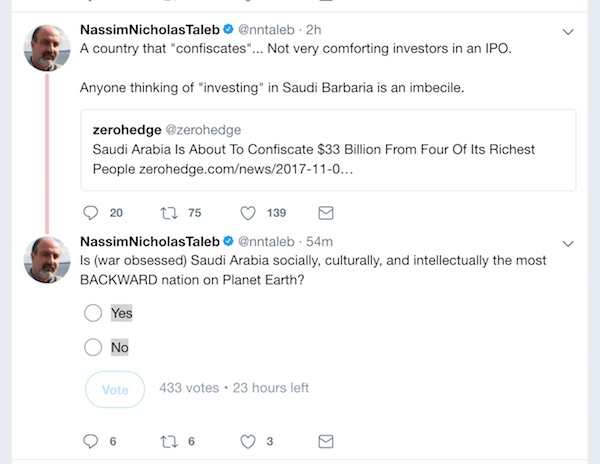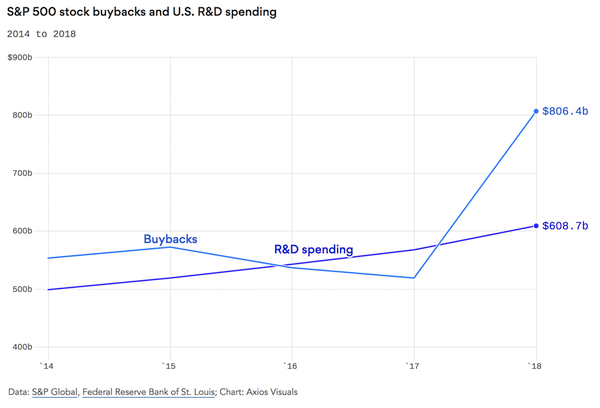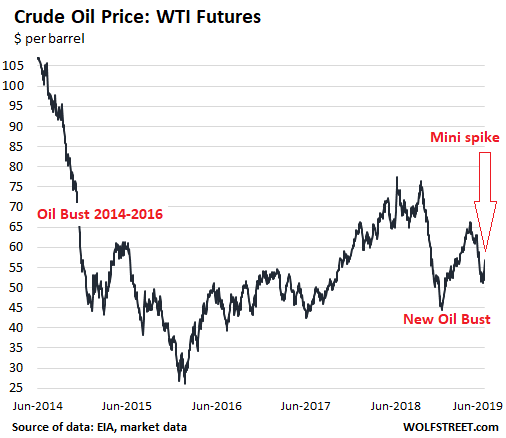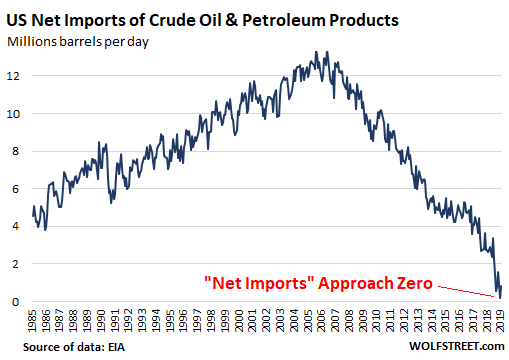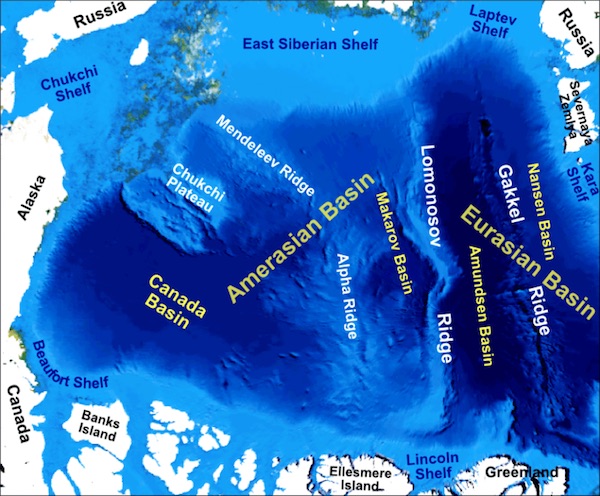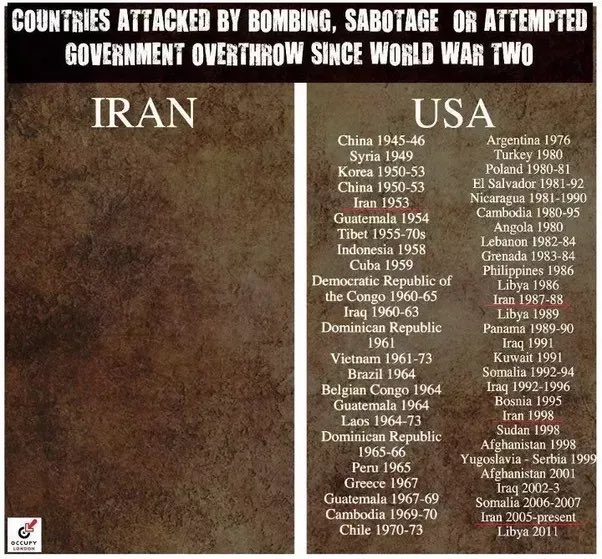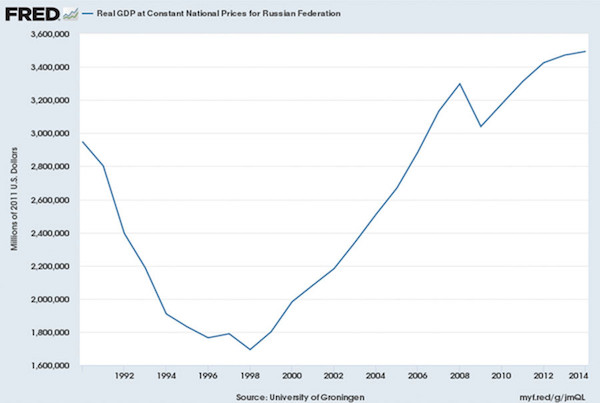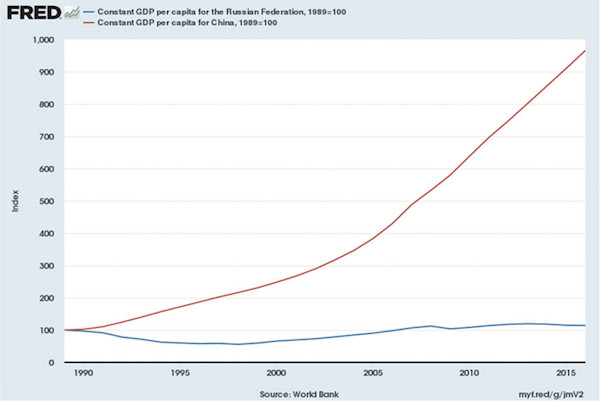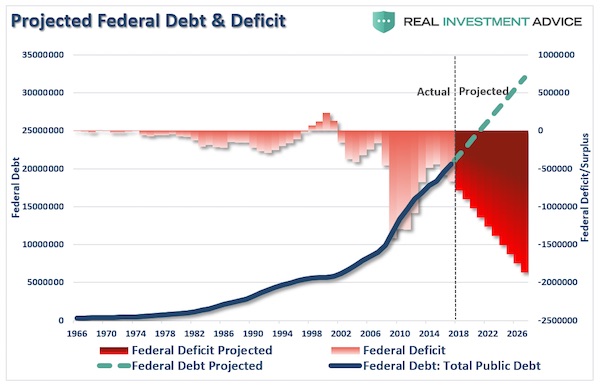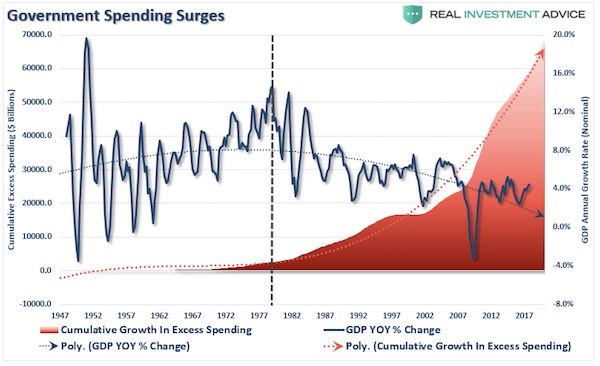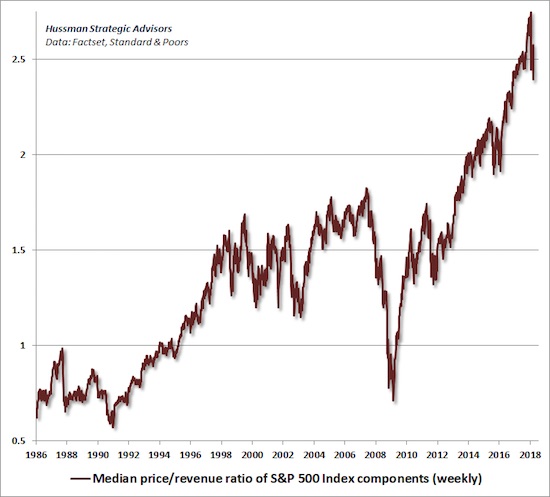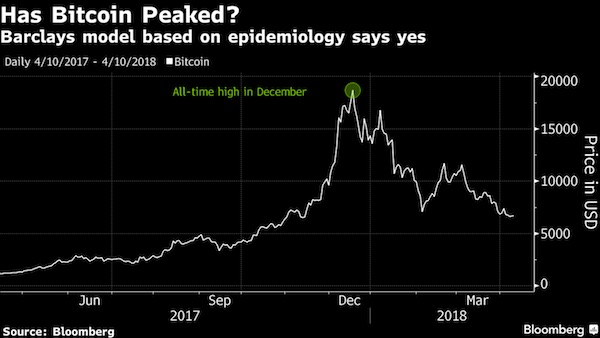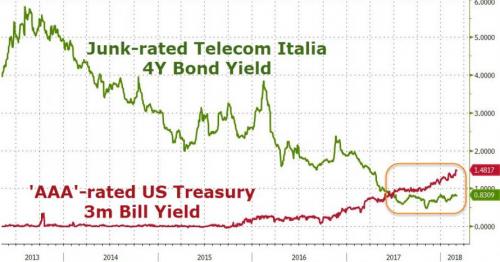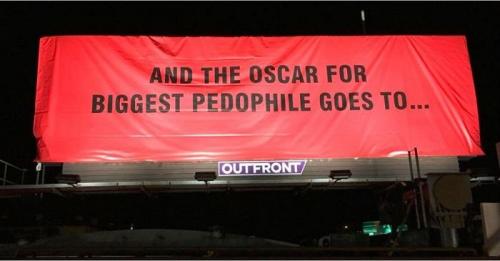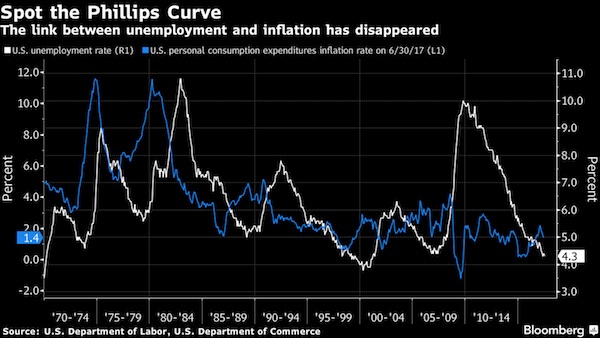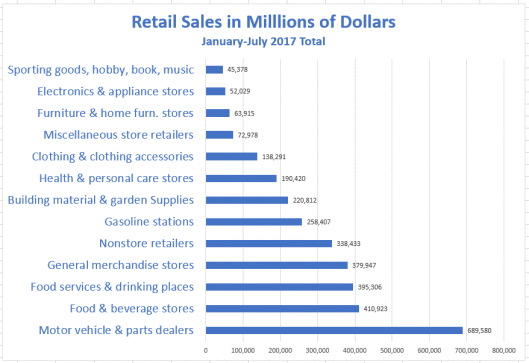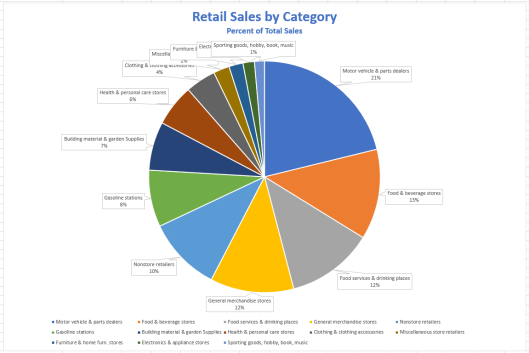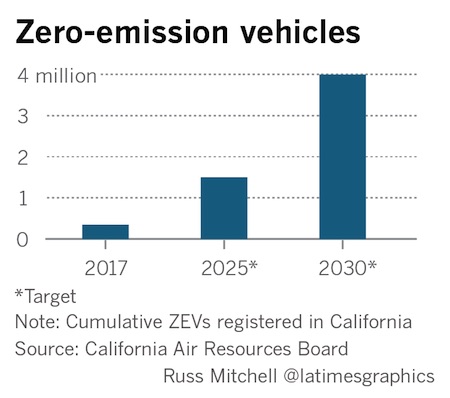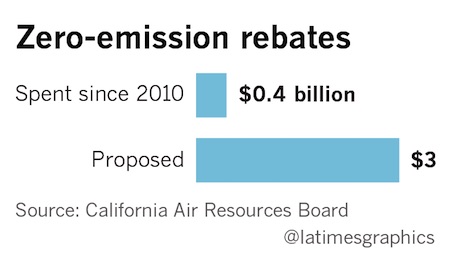
Salvador Dalí The oecumenial council 1960
Trying to figure out what on earth is happening in the Middle East appears to have gotten a lot harder. Perhaps (because) it’s become more dangerous too. There are so many players, and connections between players, involved now that even making one of those schematic representations would never get it right. Too many unknown unknowns.
A short and incomplete list of the actors: Sunni, Shiite, Saudi Arabia, US, Russia, Turkey, ISIS, Syria, Iran, Iraq, Libya, Kurds, Lebanon, Hezbollah, Hamas, Qatar, Israel, United Arab Emirates (UAE), Houthis, perhaps even Chechnya, Afghanistan, Pakistan. I know I know, add your favorites. So what have we got, or what do we know we’ve got? We seem to have the US lining up with Israel, the UAE and Saudi Arabia against Russia, Iran, Syria, Hezbollah. Broadly. But that’s just a -pun intended- crude start.
Putin has been getting closer to the Saudis because of the OPEC production cuts, trying to jack up the price of oil. Which ironically has now been achieved on the heels of the arrests of 11 princes and scores of other wealthy and powerful in the kingdom. But Putin also recently signed a $30 billion oil -infrastructure- deal with Iran. And he’s been cuddling up to Israel as well.
In fact, Putin may well be the most powerful force in the Middle East today. Well played?! He prevented the demise of Assad in Syria, which however you look at it at least saved the country from becoming another Iraq and Libya style failed state. If there’s one thing you can say about the Middle East/North Africa it’s that the US succeeded in creating chaos there to such an extent that it has zero control left over any of it. Well played?!
One thing seems obvious: the House of Saud needs money. The cash flowing out to the princes is simply not available anymore. The oil price is a major factor in that. Miraculously, the weekend crackdown on dozens of princes et al, managed to do what all the OPEC meetings could not for the price of oil: push it up. But the shrinkage of foreign reserves shows a long term problem, not some momentary blip:
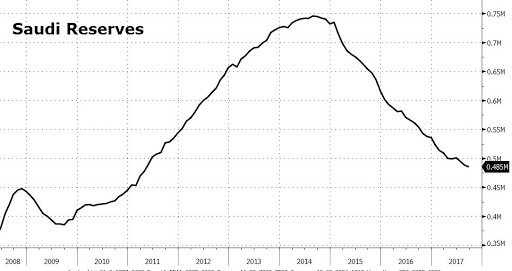
Another sign that money has become a real problem in Riyadh is the ever-postponed IPO of Saudi Aramco, the flagship oil company supposedly worth $2 trillion. Trump this week called on the Saudi’s to list it in New York, but despite the upsurge in oil prices you still have to wonder which part of that $2 trillion is real, and which is just fantasy.
But yeah, I know, there’s a million different stocks you can ask the same question about. Then again, seeing the wealth of some of the kingdom’s richest parties confiscated overnight can’t be a buy buy buy signal, can it? Looks like the IPO delay tells us something.
And then you have the 15,000 princes and princesses who all live off of the Kingdom’s supposed riches (‘only 2,000’ profit directly). All of them live in -relative- wealth. Some more than others, but there’s no hunger in the royal family. Thing is, overall population growth outdoes even that in the royal family. Which means, since the country produces nothing except for oil, that there are 1000s upon 1000s of young people with nothing to do but spend money that’s no longer there. Cue mayhem.

And things are not getting better, Saudi Arabia loses money on every barrel it produces. There are stories about them lowering their break-even price, but let’s take that with a few spoonfuls of salt. A 25% drop in break-even prices in just one year sounds a bit too good. Moreover, main competitors like Iran would still have a much lower break-even price. So even if prices would rise further, the Saudi’s might only break even while Iran gets much richer. Running vs standing still.
Saudi Arabia Leads Gulf Nations in Cutting Break-Even Oil Price
Saudi Arabia, OPEC’s biggest oil producer, is also a leader when it comes to slashing the crude price the country needs to balance its budget. The kingdom will need oil to trade at $70 a barrel next year to break even, the IMF said Tuesday in its Regional Economic Outlook for the Middle East and Central Asia. That’s down from a break-even of $96.60 a barrel in 2016, the biggest drop of eight crude producers in the Persian Gulf. The break-even is a measure of the crude price needed to meet spending plans and balance the budget.
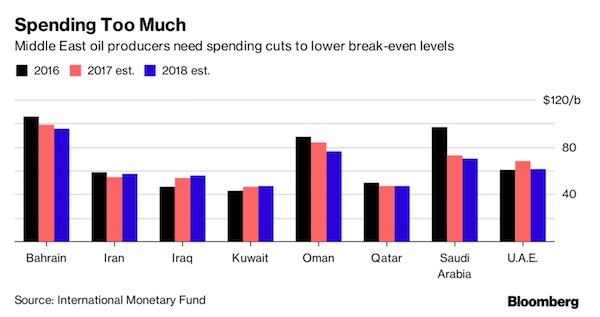
Gulf oil producers are cutting spending and eliminating subsidies after crude plunged from more than $100 a barrel in 2014 to average just over half that this year. The need to curb spending is more urgent with the Organization of Petroleum Exporting Countries cutting output to reduce a global glut. Oil will trade at $50 to $60 a barrel for the “medium term,” the IMF said.
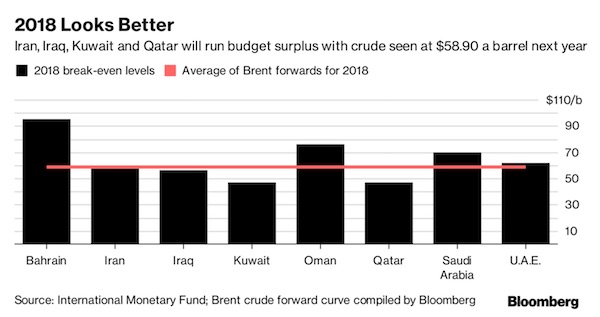
So a thorough cleansing job of the royal family is perhaps inevitable, albeit very risky. King Salman and crown prince Mohammed bin Salman are up against a very large group of rich people. But there’s no way back now.
Saudi Banks Freeze More Than 1,200 Bank Accounts in Anti-Corruption Purge
Saudi Arabian banks have frozen more than 1,200 accounts belonging to individuals and companies in the kingdom as part of the government’s anti-corruption purge, bankers and lawyers said on Tuesday. They added that the number is continuing to rise. Dozens of royal family members, officials and business executives have been detained in the crackdown and are facing allegations of money laundering, bribery, extorting officials and taking advantage of public office for personal gain. Since Sunday, the central bank has been expanding the list of accounts it is requiring lenders to freeze on an almost hourly basis…
Much more will have to follow that. Doing a half way job is far too risky once the job has started. Not even $800 billion sounds like all that much. Separate families and factions within the royal family have had decades to accumulate wealth.
Saudi Crackdown Targets Up to $800 Billion in Assets
The Saudi government is aiming to confiscate cash and other assets worth as much as $800 billion in its broadening crackdown on alleged corruption among the kingdom’s elite, according to people familiar with the matter. Several prominent businessmen are among those who have been arrested in the days since Saudi authorities launched the crackdown on Saturday, by detaining more than 60 princes, officials and other prominent Saudis, according to those people and others. The country’s central bank, the Saudi Arabian Monetary Authority, said late Tuesday that it has frozen the bank accounts of “persons of interest” and said the move is “in response to the Attorney General’s request pending the legal cases against them.”
The most visible – and perhaps richest- of all those arrested -in western eyes- is Al-Waleed. The Bloomberg estimate of his wealth that came out this week is $19 billion. But their own article seems to indicate a much higher number. He owns 5% of Apple -says Bloomberg-, and that share alone would be worth $45 billion.
Alwaleed, Caught in Saudi Purge, Has Assets Across the World
Apple – Alwaleed bought 6.23 million shares, or 5 percent, of the computer and mobile-device maker for $115.4 million in 1997. He made these purchases between mid-March and April of that year while the company was still struggling to turn itself around. He has since continued to hold the stake while Apple’s valuation has soared to as high as $900 billion.
Going through all these numbers, you can imagine why the ruling family, or rather the rulers within that family, are getting nervous. And that’s where we get to an interesting piece by Ryan Grim at the Intercept, who says it’s not even 32-year-old crown prince Mohammed bin Salman, known as MBS, or King Salman, 81, who control the kingdom these days, it’s the United Arab Emirates (UAE) -and maybe Washington-.
The coup has already been perpetrated.
Saudi Arabia’s Government Purge – And How Washington Corruption Enabled It
The move marks a moment of reckoning for Washington’s foreign policy establishment, which struck a bargain of sorts with Mohammed bin Salman, known as MBS, and Yousef Al Otaiba, the United Arab Emirates ambassador to the U.S. who has been MBS’s leading advocate in Washington. The unspoken arrangement was clear: The UAE and Saudi Arabia would pump millions into Washington’s political ecosystem while mouthing a belief in “reform,” and Washington would pretend to believe that they meant it.
MBS has won praise for some policies, like an openness to reconsidering Saudi Arabia’s ban on women drivers. Meanwhile, however, the 32-year-old MBS has been pursuing a dangerously impulsive and aggressive regional policy, which has included a heightening of tensions with Iran, a catastrophic war on Yemen, and a blockade of ostensible ally Qatar. Those regional policies have been disasters for the millions who have suffered the consequences, including the starving people of Yemen, as well as for Saudi Arabia, but MBS has dug in harder and harder. And his supporters in Washington have not blinked.
The platitudes about reform were also challenged by recent mass arrests of religious figures and repression of anything that has remotely approached less than full support of MBS. The latest purge comes just days after White House adviser Jared Kushner, a close ally of Otaiba, visited Riyadh, and just hours after a bizarre-even-for-Trump tweet. Whatever legitimate debate there was about MBS ended Saturday — his drive to consolidate power is now too obvious to ignore. And that puts denizens of Washington’s think tank world in a difficult spot, as they have come to rely heavily on the Saudi and UAE end of the bargain.
As The Intercept reported earlier, one think tank alone, the Middle East Institute, got a massive $20 million commitment from the UAE. And make no mistake, MBS is a project of the UAE — an odd turn of events given the relative sizes of the two countries. “Our relationship with them is based on strategic depth, shared interests, and most importantly the hope that we could influence them. Not the other way around,” Otaiba has said privately.
The kingdom’s broke. Not today, or tomorrow morning, but crown prince MBS is able to look at the numbers and go: Oh Shit! And if he doesn’t see it, he has Kushner (re: Israel) and Al-Otaiba to fill him in. All three relative youngsters -MBS is 32, Kushner is 36, Otaiba is 43- are exceedingly nervous by now.
And then you get war, or the threat of war. War in Yemen, a blockade of Qatar, and now ‘mingling’ in Lebanon with the somewhat mysterious removal of billionaire PM Hariri -allegedly on an Iran/Hezbollah assassination plot-, and outright threats against Iran and Hezbollah:
Lebanon’s Hariri Visits UAE As Home Crisis Escalates
Lebanon’s outgoing prime minister, Saad al-Hariri, made a brief visit to the United Arab Emirates from Saudi Arabia on Tuesday despite a deepening crisis back home and a rise in regional tensions triggered by his surprise resignation. Hariri announced his resignation on Saturday during a visit to his ally Saudi Arabia and has not yet returned to Lebanon. He said he believed there was an assassination plot against him and accused Iran, Saudi Arabia’s arch-rival, and its Lebanese ally Hezbollah of sowing strife in the Arab world.
His resignation has thrust Lebanon back into the frontline of the regional rivalry that pits a mostly Sunni bloc led by Saudi Arabia and allied Gulf monarchies against Shi‘ite Iran and its allies. Hariri’s office said he had flown to Abu Dhabi on Tuesday and then returned to Riyadh, but it gave no reason for the trip. It also did not say when he would return home. Hariri’s Future TV channel said he would also visit Bahrain but gave no reason.
In short: billionaire PM Hariri is a puppet. Just perhaps not of Saudi Arabia, but of Abu Dhabi. Whether he’s under house arrest in Riyadh, as has been suggested, is still unclear. But it’s a safe bet that he didn’t fly to Abu Dhabi -and back- alone, or of his own accord. He went to receive instructions.
Saudi Arabia Accuses Iran Of ‘Direct Military Aggression’ Over Yemen Missile
Saudi Arabia’s crown prince has accused Iran of “direct military aggression” by supplying missiles to Houthi rebels in Yemen, raising the stakes in an already tense standoff between the two regional rivals. Mohammed bin Salman linked Tehran to the launch of a ballistic missile fired from Yemen towards the international airport in the Saudi capital of Riyadh on Saturday. The missile was intercepted and destroyed.
“The involvement of the Iranian regime in supplying its Houthi militias with missiles is considered a direct military aggression by the Iranian regime,” the prince said on Tuesday during a phone conversation with the UK foreign secretary, Boris Johnson, according to the state-run Saudi Press Agency. He added that the move “may be considered an act of war against the kingdom”. Iran has called Riyadh’s accusations as baseless and provocative.
We have way of knowing what is true or not about this. We do know that Saudi Arabia have been executing a barbaric war in Yemen. With weapons from the US, UK, et al. So someone firing back wouldn’t be that far-fetched.
Regardless, Pepe Escobar, a journalist who knows much more than his peers, or at least doesn’t hold back as much as them, doesn’t see this end well for MBS, UAE, Israel, US, and whoever else is in their corner. Another losing war for the US in the Middle East? We’re losing count.
The Inside Story Of The Saudi Night Of Long Knives
A top Middle East business/investment source who has been doing deals for decades with the opaque House of Saud offers much-needed perspective: “This is more serious than it appears. The arrest of the two sons of previous King Abdullah, Princes Miteb and Turki, was a fatal mistake. This now endangers the King himself. It was only the regard for the King that protected MBS. There are many left in the army against MBS and they are enraged at the arrest of their commanders.” To say the Saudi Arabian Army is in uproar is an understatement. “He’d have to arrest the whole army before he could feel secure.”
[..] The story starts with secret deliberations in 2014 about a possible “removal” of then King Abdullah. But “the dissolution of the royal family would lead to the breaking apart of tribal loyalties and the country splitting into three parts. It would be more difficult to secure the oil, and the broken institutions whatever they were should be maintained to avoid chaos.” Instead, a decision was reached to get rid of Prince Bandar bin Sultan – then actively coddling Salafi-jihadis in Syria – and replace the control of the security apparatus with Mohammed bin Nayef. The succession of Abdullah proceeded smoothly.
Power was shared between three main clans: King Salman (and his beloved son Prince Mohammed); the son of Prince Nayef (the other Prince Mohammed), and finally the son of the dead king (Prince Miteb, commander of the National Guard). In practice, Salman let MBS run the show. And, in practice, blunders also followed. The House of Saud lost its lethal regime-change drive in Syria and is bogged down in an unwinnable war on Yemen, which on top of it prevents MBS from exploiting the Empty Quarter – the desert straddling both nations. The Saudi Treasury was forced to borrow on the international markets. Austerity ruled …
[..] aversion to MBS never ceased to grow; “There are three major royal family groups aligning against the present rulers: the family of former King Abdullah, the family of former King Fahd, and the family of former Crown Prince Nayef.” Nayef – who replaced Bandar – is close to Washington and extremely popular in Langley due to his counter-terrorism activities. His arrest earlier this year angered the CIA and quite a few factions of the House of Saud – as it was interpreted as MBS forcing his hand in the power struggle. According to the source, “he might have gotten away with the arrest of CIA favorite Mohammed bin Nayef if he smoothed it over but MBS has now crossed the Rubicon though he is no Caesar. The CIA regards him as totally worthless.”
[..] The source, though, is adamant; “There will be regime change in the near future, and the only reason that it has not happened already is because the old King is liked among his family. It is possible that there may be a struggle emanating from the military as during the days of King Farouk, and we may have a ruler arise that is not friendly to the United States.”
In the end, it all comes down to a familiar theme: follow the money. And we need to seriously question the economic reality of Saudi Arabia. That graph above of their foreign reserves looks downright grim.
With money comes power. Who loses money loses power. Saudi Arabia is bleeding money. The population surge is uncanny, and there are no jobs for all these young people. Perhaps the best they can do is be a US/Israel puppet in an attempt to ‘redo’ the map of the Middle East, but that has not been a very successful project off late -like the past 100 years-.
Then again, when you’re desperate you do desperate things. And when you’re a 32-year-old crown prince with more enemies than you can keep track of, you use what money is left to 1) keep up appearances, 2) steal what others have gathered, 3) buy weapons up the wazoo, and 4) go to war.
It all paints a very dark picture for the world. Russia won’t stand for attacks on Iran. And Iran won’t let attacks on Lebanon/Hezbollah go unanswered. All that is set to push up oil prices further, and all parties involved are just fine with that. Because they can buy more weapons with the additional profits.
I’ll leave you with Nassim Taleb’s comments on the situation. After all, Nassim’s from Lebanon, and knows that part of the world like the back of his hand:
